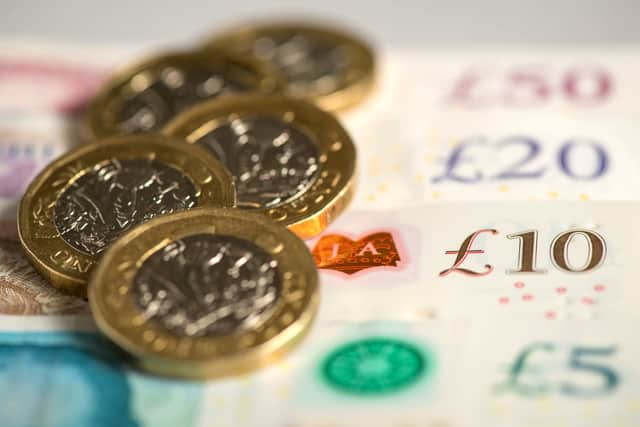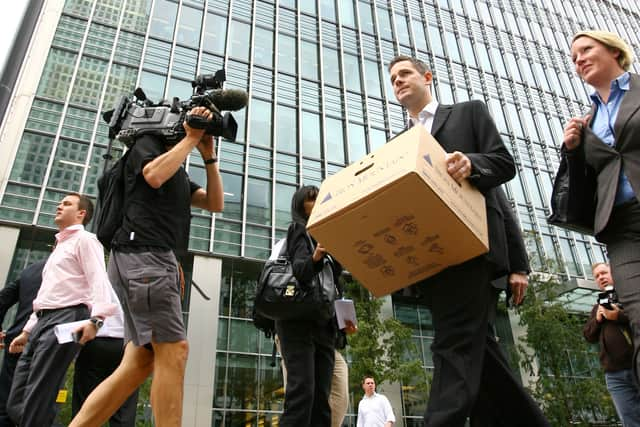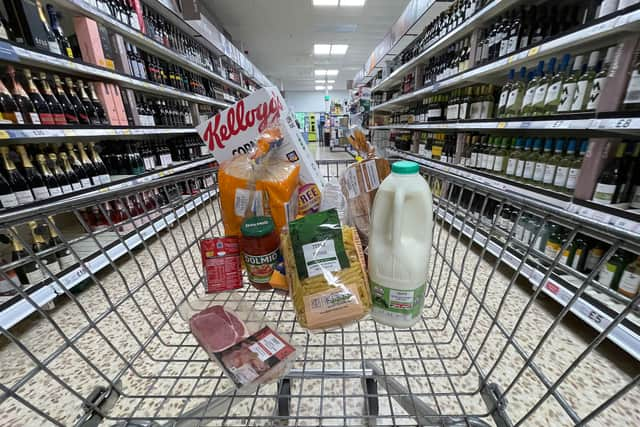What is a recession? Meaning, is UK recession 2023 coming, what it means for economy explained
and live on Freeview channel 276
Over the last nine months or so, you are likely to have heard multiple warnings about an impending UK recession - an event that can cause serious economic hardship.
Gloomy forecasts about the state of the nation’s finances have mostly stemmed from the worst cost of living crisis in decades. Inflation hit a 41-year high in October 2022 and is still close to its high watermark, while interest rates have risen as the Bank of England has moved to bring the rate of price rises down to a more manageable level.
Advertisement
Hide AdAdvertisement
Hide AdWith these twin forces driving up the costs for households and businesses, with firms also struggling with labour shortages, supply chain difficulties and Brexit, fears have grown that economic growth will slam into reverse. Recent forecasts from the Bank of England and International Monetary Fund (IMF) have both stated that this event will happen in 2023.
But the UK has so far managed to defy expectations, with the economy growing very marginally in January. And in his Spring Budget, Chancellor of the Exchequer Jeremy Hunt said the UK would avoid a “technical recession” in 2023, albeit with the economy set to decline over the course of 2023 and then see low growth for several years afterwards, according to analysis by public body the Office for Budget Responsibility (OBR).
So, what exactly is a recession - and what usually happens when one hits?
What is a recession?
A recession is when a country experiences economic decline. The UK’s wealth is calculated by its Gross Domestic Product (GDP). When the GDP rate falls below zero, it means the economy is shrinking.
Advertisement
Hide AdAdvertisement
Hide AdHowever, to be a ‘technical’ recession, the economy has to decline for two quarters in a row (a period of six months). Although the UK’s GDP is expected to shrink by 0.2% over the course of this year, the OBR believes the economy’s reversal will not be classed as a recession in a traditional sense.
The reason why economic reversals matter is that they can have an impact on living standards. With consumers and businesses struggling to grow their wages and output, the economy generates less money for the country in the form of taxes, which then tends to mean there is less cash for public services and investment in future growth.


Is the UK going into a recession?
A recession has been on the cards for several months as the economy struggled to grow much throughout 2022.
When the UK’s economic picture was at its worst in the wake of the Liz Truss mini budget, the Bank of England expected it would be the longest one on record - lasting for eight quarters until the end of 2024. But six months on, the outlook has improved.
Advertisement
Hide AdAdvertisement
Hide AdAccording to the OBR, GDP is expected to fall 0.2% over the course of 2023 before going up 1.8%, 2.5%, 2.1% and then 1.9% over the following four years. Although the 2023 drop is not expected to be the 1.4% crash the OBR had predicted in its last update November, the longer-term growth it has forecast is weaker than what it had predicted from 2025 onwards.
The UK’s economy is faltering because of record inflation, the interest rates being introduced to slow down price rises, staff shortages and supply chain issues - all of which have created an environment of low consumer and business confidence. If these two groups that drive the economy don’t feel optimistic, they will spend less and, in the case of businesses, are likely to make or generate less.
What happens in a recession?
When economic growth turns into economic decline, it means people and businesseses find it much tougher to operate. The general public tends to see living standards and job opportunities decline, while companies look to save money and risk going out of business altogether.
With investment is likely to be reduced, jobs get cut and, ultimately, the government receives less money through taxation. In the last major recession in 2008, unemployment levels peaked at 10%. In the 2023 economic contraction, the Resolution Foundation think tank predicts a 4.4% unemployment rate.


Advertisement
Hide AdAdvertisement
Hide AdFor consumers who hold onto their jobs, they are less likely to receive pay increases - something which can severely dent their purchasing power when inflation is high. This in turn means they are unlikely to spend money on anything other than basics, such as food, fuel and household costs. Indeed, progressive think tank IPPR has warned the biggest problem facing the UK is that “the living standards of ordinary families” will suffer unless the government presents a plan to create “meaningful growth”.
The OBR analysis accompanying the Spring Budget says living standards will fall to their worst levels since 1957 this year. In other words, the cost of living has become much higher, which means people can spend less on the goods and services that can ensure their health and happiness.
The political consequences of a recession can also be tough. Governments have tended to pursue austerity during these economic contractions. This policy usually sees spending on public services reduce in response to the drop in the amount of tax the government collects from people and businesses. This outcome is already likely to be happening given the government has not topped up departmental budgets - apart from defence - despite the high rate of inflation.
While economic reversals give governments less breathing space with the nation’s finances, this policy is just one option at the country’s disposal.


How long does a recession last?
Advertisement
Hide AdAdvertisement
Hide AdThe length of time a recession lasts depends on the measures the government put in place to help revive the economy. According to Forbes Magazine, the average recession in the USA lasts for 11 months.
After the 2008 recession, it took the UK five years to get its economy back on to the size it was before the fallout. While the UK will avoid a recession, according to official estimates, the big question is whether it can avoid stagflation and return to healthy levels of growth.
When was the last UK recession?
The last time the UK entered a recession was August 2020. Due to the Covid-19 pandemic, businesses closed with many people losing their jobs and GDP fell by 20.4%.
But the most famous recession to hit the UK was the crash of 2008. Dubbed the great recession, it was caused by rising energy prices and the collapse of the housing market. This recession lasted for five quarters and was the longest one on record since the second world war. The downturn of 2008 was global, impacting all of the G7 countries.


What happens when there are high rates of inflation?
Advertisement
Hide AdAdvertisement
Hide AdRecession is more likely when inflation is high. The current rate of inflation in the UK is 10.1% - lower than the record 11.1% rate seen in October 2022 but still very high.
As most wages have not kept pace with this level of inflation, consumers are likely to be experiencing a hit to their purchasing power. Indeed, incomes are unlikely to get back to their pre-Covid pandemic levels before 2028, according to the Resolution Foundation. This scenario means people are unlikely to be spending money on anything beyond basic items or services, which, in turn, dents companies’ sales.
Given businesses have also been hit by rising costs, they are likely to be reducing investment. Ultimately, this chain of events leads economic growth to decline or stall completely.
Comment Guidelines
National World encourages reader discussion on our stories. User feedback, insights and back-and-forth exchanges add a rich layer of context to reporting. Please review our Community Guidelines before commenting.